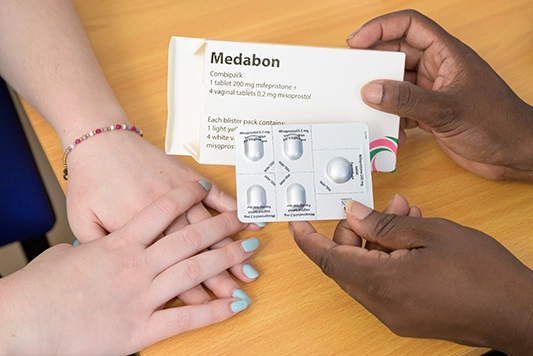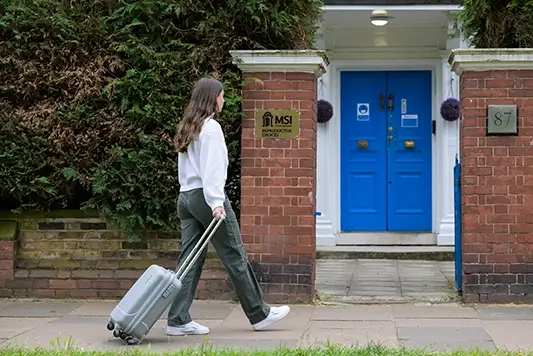The Criminal Justice Bill has been making its way through Parliament, and is due to be debated in the House of Commons on 4th June. Several MPs have tabled amendments which would change abortion law in England and Wales. Two amendments are from pro-choice MPs and seek to deliver progressive reforms. The other three are from MPs with a long record of opposing abortion rights. These amendments seek to restrict access by reducing time limits in different ways.
Write to your MP using our tool here and help us protect abortion access in England and Wales.
The amendments
- Amendment NC1 (tabled by Diana Johnson MP, Labour): a moderate amendment with cross party support, backed by abortion providers, the Royal Colleges, and prominent gender-based violence charities. If passed, this amendment will mean no-one faces prosecution or jail for ending their own pregnancy, without changing any other aspect of abortion law or regulation, including the legal time limits for provision.
- Amendment NC40 (tabled by Stella Creasy MP, Labour): another amendment which seeks to reform abortion law. It would make abortion access unconditional up to 24 weeks but would be unlikely to solve the problem of women facing investigations when suspected of ending their pregnancy over the legal limit.
- Amendment NC15 (tabled by Caroline Ansell MP, Conservative): an amendment from an anti-choice MP which seeks to reduce the time limit from 24 weeks’ gestation to 22 weeks. If passed, this amendment would be devastating for the small but significant minority of people who seek abortion at 22 weeks’ gestation or above. It would deny abortion access to around 1,500 women a year.
- Amendment NC41 (tabled by Liam Fox MP, Conservative): If passed, this would make it illegal for doctors to provide abortion beyond the usual time limit where a diagnosis of Down’s Syndrome is the “sole factor” in determining that there is a “serious risk” of disability. This amendment would prevent individuals from making complex and often very challenging decisions for themselves.
- Amendment NC115 (tabled by Flick Drummond MP, Conservative): If passed, this amendment would force every single person accessing abortion to attend a clinic in person, regardless of preferences, clinical need, or personal safety. This runs contrary to recommended best practice from the Royal College of Obstetricians and Gynaecologists, the National Institute for Clinical Excellence, the World Health Organisation, and the British Medical Association. It also goes against the recommendations of gender-based violence charities including Rape Crisis England and Wales, Karma Nirvana, and the End Violence Against Women Coalition.
Reforming our Victorian abortion laws
We support reforming the law so that nobody faces prosecution for ending their own pregnancy.
In recent years, there has been a worrying rise in the number of women investigated following unexplained pregnancy loss. There are many circumstances which can lead to people finding themselves under police suspicion. Those who have already been investigated include potential trafficking victims, domestic abuse survivors, and women who have had unexpected miscarriages. But regardless of the reason, we don’t believe it is ever in the public interest for anyone to go to prison for ending their own pregnancy.
Amendment NC1 would mean that no-one faces prosecution for ending their own pregnancy, while leaving the rest of abortion law and regulation, including the legal time limit for provision, unchanged. As a leading abortion provider, we strongly support progressive abortion law reform and encourage MPs of all parties to add their names to NC1 and vote in favour of the amendment.
Reducing the time limit
We oppose any reductions in the time limit. Amendments NC15 and NC41 are both attempts to restrict abortion access, which is a common tactic employed by anti-abortion groups.
NC15 would reduce the time limit from 24 weeks to 22 weeks. None of the relevant clinical bodies support reducing the time limit. The most common reasons for seeking abortion at 22 weeks or above are domestic abuse, the pregnancy not being identified until the second trimester (common in young women and girls who have been assaulted), and foetal anomalies or health risks, some of which can be fatal.
NC41 seeks to make it illegal provide or access abortion over the usual time limit for certain foetal anomalies. At the moment, abortion is legal beyond 24 weeks when there is a “serious risk” of disabilities. NC41 would make it illegal for doctors to provide abortion over the usual time limit when diagnosis of Down’s Syndrome is the “sole factor” in determining that there is a “serious risk” of disabilities. Foetal anomalies are often not detected until 20 weeks or later in the pregnancy, with some scans and tests only possible at 21 weeks, and with results and follow up tests taking even longer.
This amendment would politicise and oversimplify deeply personal decisions and force many people into making complex, sometimes heartbreaking, decisions before they have all the information. It would also put doctors in the difficult position of determining whether highly personal reasons for requesting an abortion meet the legal criteria. There can be multiple interconnected factors behind these decisions. For example, the risk of late miscarriage or stillbirth is 10 times higher for pregnancies with Down’s Syndrome. This law would make it difficult for women and their families to take this risk into consideration when deciding whether to continue the pregnancy.
Making Early Medical Abortion at home illegal
We oppose any restrictions on Early Medical Abortion at home (telemedicine). This has no clinical or ethical basis, it runs contrary to all reputable clinical bodies and evidence, and would be devastating for women, especially the most vulnerable.
In 2022, Parliament voted to make telemedicine a permanent option, following a successful pilot during the COVID-19 pandemic. Medical abortion involves taking two pills; this legal change meant that both pills, instead of just the second, could legally be taken at home. The fact that this was ever unlawful was a relic of our outdated abortion laws with no clinical or ethical basis, and no relevance for abortion care today. Multiple peer-reviewed studies have found telemedicine to be a safe, popular service which is preferred by the majority of women.
Offering the option of home use is particularly important for people who struggle to attend face-to-face appointments, including those in abusive relationships, those with caring responsibilities, and those without transport. Before telemedicine was legal, four to five women a day were accessing pills online through unregulated providers. Since the regulated, legal service has been available, this has fallen to virtually zero. Buying abortion pills online through unregulated providers meant they had no support, no safeguarding, no free counselling, and no referrals into other community support such as domestic abuse services. By accessing care legally, through the regulated, NHS-funded system, this support becomes available and our trained safeguarding midwives can identify vulnerable people and make sure they get are protected.
We urge MPs vote against this amendment.
Write to your MP
We support an information-led approach. We trust women to decide what is right for their own bodies, their own health, and their own lives.
If you agree, write to your MP using our tool here.







